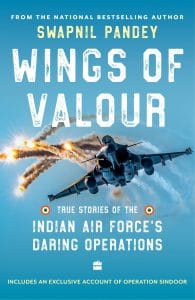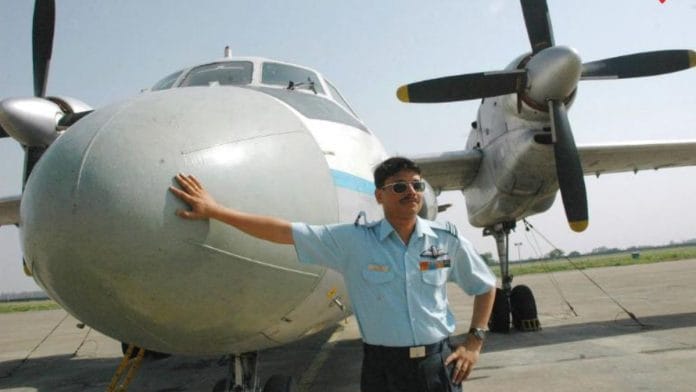After the briefing, everyone hurried to prepare for the mission. Nachiketa, dressed in a green G-suit over his blue overalls, meticulously adjusted his gear in the squadron’s dressing room. His green jacket shielded him from the chill, and his standard-issue pistol was checked and securely holstered. The pouches on his G-suit held essential manuals, navigation maps and communication frequencies.
The mission briefing was thorough. Each pilot knew their role, the direction of attack, altitude and initial point. Communication was to be restricted to avoid enemy interception. The sequence was precise: Boxer-1 flown by Flight Lieutenant Anupam Banerjee and Boxer-2 by Flight Lieutenant Bhupendra Khatana would first deploy bombs, followed by Hyena-1 by Squadron Leader Ashwini Madokhot and Hyena-2 by Flight Lieutenant K. Nachiketa dropping rockets—the rockets were for targeted strikes, while the bombs would inflict widespread damage.
The aircraft were parked in blast pens for protection. Nachiketa climbed the ladder into his MiG-27, focused and eager. He fastened his seat harness and connected the pneumatic hose of his G-suit to the cockpit port. A technician removed the ladder, and Nachiketa closed the cockpit canopy. After a quick system check, he lowered his helmet visor and signalled that he was ready.
The engines roared to life as the pilots taxied out from the blast pen to the runway. The formation took off as a tight unit, with Nachiketa the last to leave, marking the start of Day 2 of Operation Safed Sagar.
The sky was clear as they flew in formation, weaving through hills to avoid enemy radar. Cruising at 26,000 feet and at around 1,000 kilometres per hour, the fighters approached the initial point, the landscape shifting from mountains to the target area.
Boxer-1 initiated his dive and released his bombs, followed by Boxer-2. The explosions created a dense plume of smoke, obscuring Hyena-1’s view. Unable to see the target clearly, Hyena-1 refrained from dropping his rockets.
As Nachiketa—Hyena-2—approached, the smoke began to clear. He completed his dive and released his rockets with precision. It was followed by gun attack but as he pulled out, disaster struck—the engine sputtered and then fell silent. Temperature and RPM13 dropped rapidly, and airspeed decreased. Nachiketa knew he had to act swiftly. He jettisoned the drop tank to reduce drag, hoping to buy a few precious moments.
Also read: How fake photos, names helped two Indian prisoners of war escape Singapore Bidadari camp
He quickly radioed Hyena-1:
‘Mando, Nachi engine flame out! Relighting!’ He began the restart procedure.
The engine sputtered back to partial life, but with the hills approaching rapidly and only thirty to forty seconds to spare, Nachiketa knew he had no choice but to eject.
He informed his wingman, ‘Mando, Nachi ejecting,’ and pulled the ejection handle.
The ejection system activated swiftly: The cockpit canopy blew off and the seat was propelled out of the cockpit by a high-speed cartridge. A small drogue parachute deployed first to stabilize the seat, followed by the main parachute. Everything happened in a matter of seconds.
The ejection subjected him to extreme G-forces,14 causing him to experience a grey-out, where vision blurs and consciousness fades. Though the G-suit helped, it was less effective outside the craft. The descent was swift, landing him on a snow-covered, icy landscape.
As he touched down, he saw his aircraft’s wreckage nearby.
Despite the intense pain in his spine from the impact of landing, his survival instincts kicked in. He buried classified documents in the snow to prevent enemy access and dashed across the terrain, seeking cover among nearby boulders.
Suddenly, five figures emerged from the direction of a nearby river. Armed with AK-47s, they advanced, firing at Nachiketa. He fired back with his pistol, but it felt futile.
Group Captain Nachiketa (veteran) chuckled as he reflected:
You know, up in the air, fighter pilots feel invincible. Flying a 20,000 kg aircraft at lightning speed, you can cross from one corner of the earth to another in seconds. We’re the warriors of the sky, untouchable and powerful. But then, imagine the sudden shift when you come out of that comfort zone and feel utterly vulnerable. Up there, I was the king of the skies, but on the ground, I was just a mortal. Everything seemed immense and overwhelming. The severe back pain from the rough landing was a sharp reminder of my vulnerability. The sound of gunfire jolted me into action. I scrambled to find cover, drawing my small pistol and loading it as I took refuge behind a nearby boulder, firing back in desperation.
As his first magazine emptied, he reached for a second, but before he could reload, the enemy closed in and began to beat him mercilessly. As Nachiketa lay on the snow-covered ground, the tension peaked when one of the soldiers pressed the cold barrel of an AK-47 into his mouth, the finger poised on the trigger.
Just as it seemed his fate was sealed, A Pakistani Officer arrived and intervened.
The soldiers were angry. One shouted, ‘We’re not letting him go. He was dropping bombs from above and firing at us from below.’ With authoritative calm, the officer replied, ‘It’s all right. He was doing his duty. Now he is our captive.’
Nachiketa recalled:
That day, death came close to me twice. First, when my aircraft crashed and I had to eject. Second, when the soldiers were about to shoot me, and that officer arrived just in time. Had he been even a moment late or given the order to kill, I would have been dead. I have immense respect for that officer, Captain Qamar of the 5th Northern Light Infantry.
Severely injured and blindfolded, Nachiketa was herded downhill by the Pakistani men—the officer and five soldiers. As they descended, one soldier asked if there were any other pilots with him, possibly mistaking the drogue parachute as belonging to a second person. Nachiketa seized the opportunity to mislead them, replying, ‘Yes, there was another pilot.’
Unfamiliar with aircraft systems and focused on finding the supposed second pilot, the soldiers did not question him further.
 The excerpt from Swapnil Pandey’s ‘Wings of Valour’ has been published with permission from HarperCollins India.
The excerpt from Swapnil Pandey’s ‘Wings of Valour’ has been published with permission from HarperCollins India.






